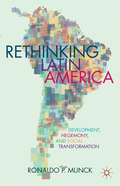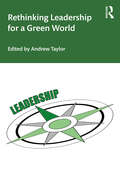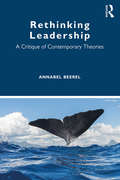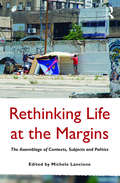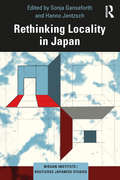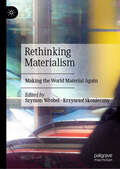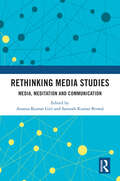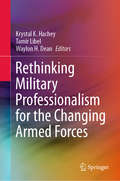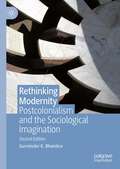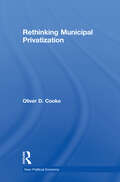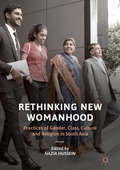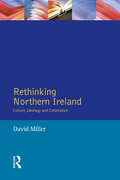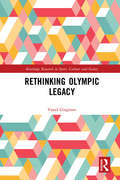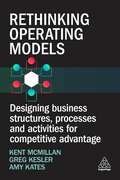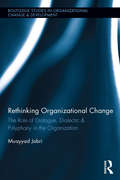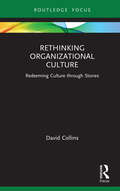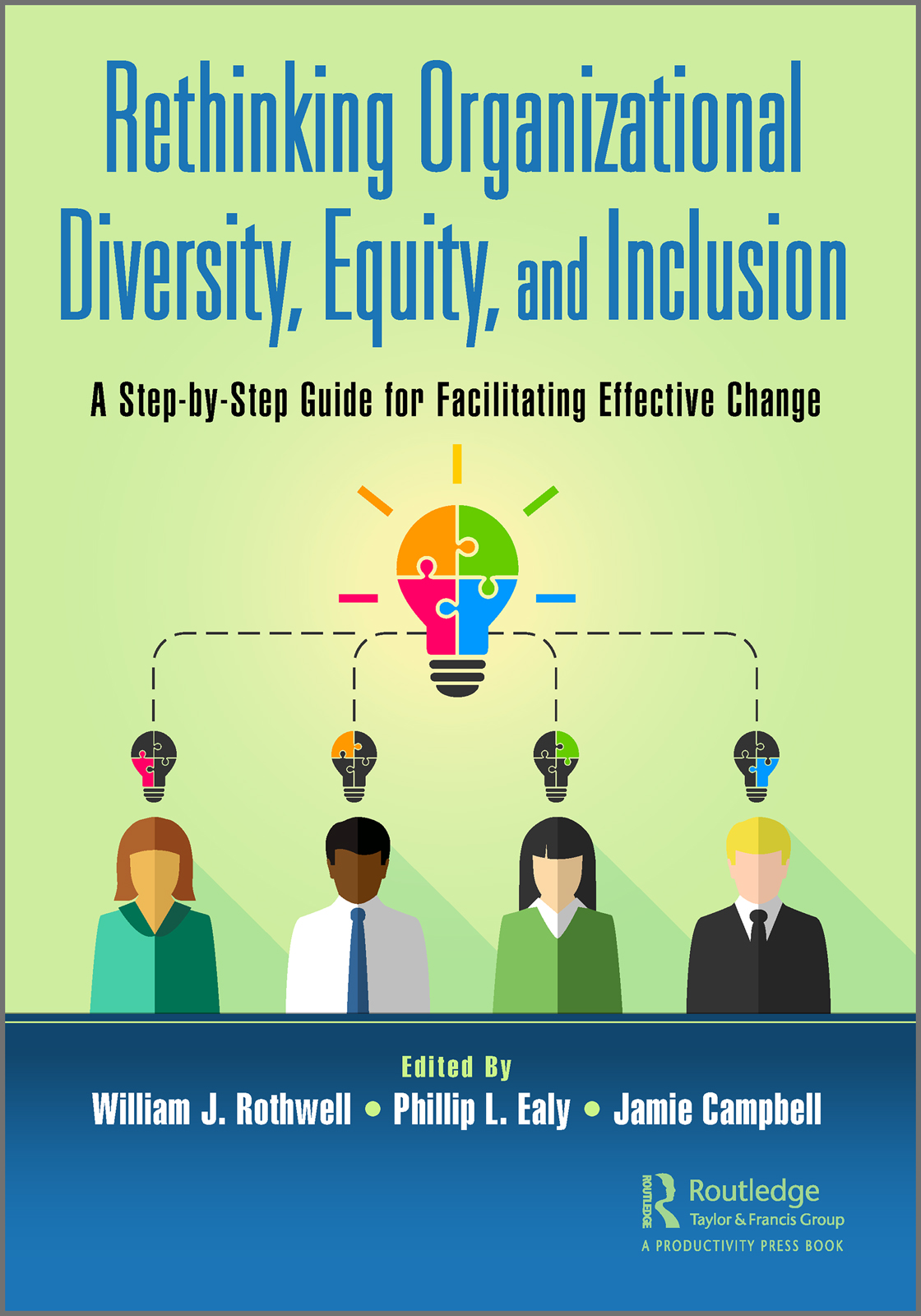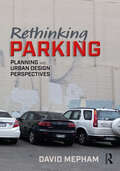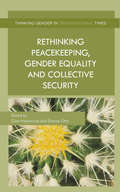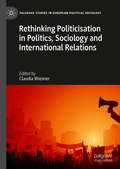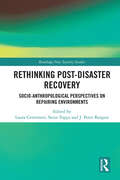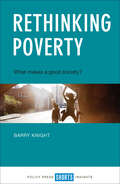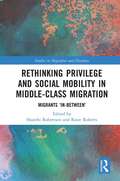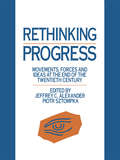- Table View
- List View
Rethinking Latin America
by Ronaldo MunckLatin America is assuming an increasingly important position on the world stage with its heterodox economic policies and bold political experiments attracting world-wide attention in an era characterized by a general crisis of perspectives. Since European colonization from 1500 onwards, the region has played a key role in the modernization and enrichment of Europe and the West. Today, the West is in crisis and the whole Enlightenment discourse is thrown into question. Is it possible that Latin America now shows the West where it is heading? With complex, dynamic, conflictual, but, above all, original processes of development - and with new visions of social transformation and new constructions of hegemony - the region offers a fascinating laboratory for the rest of the world and, maybe, a mirror of the future.
Rethinking Leadership for a Green World
by Andrew TaylorFirst James Lovelock, and recently Prince William and David Attenborough believe that we have reached a tipping point in the process of climate change. Whether they are right or not, it is certainly true that the impact of humankind upon the ecology of the earth has reached a point where real changes in human behaviour are required. If managers are to be enablers of planetary survival then we need to develop a new approach to risk, which explicitly includes ecological limits upon economic behaviour. This implies a fundamental reorientation of their role in allocating resources to minimise risk and maximise reward. This book brings together some of the brightest contemporary thinkers on leadership, complexity and sustainability to consider the big ideas that we will need to make the changes required, and to outline the major themes that can inform a new approach to constructing a green world. It looks at how to ensure that local models of sustainability are able to flourish in the context of global networks and presents specific case studies of markets and organisations that offer insights into the development integrated solutions and the leadership lessons we can learn. Combining both theory and practice, this book serves to guide business managers and provides deeper insight and critical perspectives on some of the key issues facing leaders moving towards the green economy. It also provides useful supplementary reading for students in business and environmental studies.
Rethinking Leadership: A Critique of Contemporary Theories
by Annabel BeerelThis book provides a detailed review of the key leadership theories and skills required during times of crises and radical uncertainty, how these can be developed, and how they can be applied in practice. Written over the course of the 2020 pandemic, the book highlights the immense lack of leadership competencies required for effective leadership in times of radical uncertainty and provides in-depth insights into the capacities and skills that should be part of all leadership development. The latest leadership theories, as well as existing key styles, including mindful leadership, the neuroscience of leadership, and transpersonal and adaptive leadership, are discussed and critiqued along with their potential contribution to developing effective leaders. Each chapter concludes with a convenient executive summary and questions that can be used for teaching purposes and class discussion. This is a comprehensive book about the interdisciplinary and multifaceted requirements of leadership and how to attain those capacities to develop effective leaders. It will be valuable for advanced undergraduate as well as postgraduate courses as a foundational resource on leadership theory and its application in practice.
Rethinking Life at the Margins: The Assemblage of Contexts, Subjects, and Politics
by Michele LancioneExperimenting with new ways of looking at the contexts, subjects, processes and multiple political stances that make up life at the margins, this book provides a novel source for a critical rethinking of marginalisation. Drawing on post-colonialism and critical assemblage thinking, the rich ethnographic works presented in the book trace the assemblage of marginality in multiple case-studies encompassing the Global North and South. These works are united by the approach developed in the book, characterised by the refusal of a priori definitions and by a post-human and grounded take on the assemblage of life. The result is a nuanced attention to the potential expressed by everyday articulations and a commitment to produce a processual, vitalist and non-normative cultural politics of the margins. The reader will find in this book unique challenges to accepted and authoritative thinking, and provides new insights into researching life at the margins.
Rethinking Locality in Japan (Nissan Institute/Routledge Japanese Studies)
by Sonja GanseforthThis book inquires what is meant when we say "local" and what "local" means in the Japanese context. Through the window of locality, it enhances an understanding of broader political and socio-economic shifts in Japan. This includes demographic change, electoral and administrative reform, rural decline and revitalization, welfare reform, as well as the growing metabolic rift in energy and food production. Chapters throughout this edited volume discuss the different and often contested ways in which locality in Japan has been reconstituted, from historical and contemporary instances of administrative restructuring, to more subtle social processes of making – and unmaking – local places. Contributions from multiple disciplinary perspectives are included to investigate the tensions between overlapping and often incongruent dimensions of locality. Framed by a theoretical discussion of socio-spatial thinking, such issues surrounding the construction and renegotiation of local places are not only relevant for Japan specialists, but also connected with topical scholarly debates further afield. Accordingly, Rethinking Locality in Japan will appeal to students and scholars from Japanese studies and human geography to anthropology, history, sociology and political science.
Rethinking Materialism: Making the World Material Again
by Szymon Wróbel Krzysztof SkoniecznyTaking as its starting point the diagnosis that events such as the pandemic, the ecological crisis, and the increasingly volatile international situation have made our relationship to the world problematic, the book aims to survey the ways in which this new situation can be productively theorized. Its three parts focus on: discourses of the &“loss&” of the world; attempts at resistance to this loss and regaining the &“common&” world; and discussions of matter as the &“stuff&” of the world.
Rethinking Media Studies: Media, Meditation and Communication
by Ananta Kumar Giri and Santosh Kumar BiswalThis book reconsiders media studies from different philosophical and theoretical perspectives from around the world. It brings together diverse views and visions from thinkers such as Sr Aubrobindo, Jurgen Habermas, Paul Ricoeur, Pope Francis, and Satyajit Ray, among others. The authors focus on the issues of ethics, aesthetics, meditation, and communication in relation to media studies and explore the links between media and mindfulness. The volume includes case studies from India, United States, Switzerland, and Denmark and presents empirical works on new horizons of critical media studies in different fields such as American news media and creative media lab. A unique contribution, this book will be indispensable for students and researchers of journalism, communication studies, social media, behavioural sciences, sociology, philosophy, cultural studies, and development studies.
Rethinking Military Professionalism for the Changing Armed Forces
by Waylon H. Dean Tamir Libel Krystal K. HacheyThis book will make a first contribution to identify the gaps in current practices and provide alternative mechanisms to conceptualize professionalism that is reflective of changing requirements, culture, and demographics of the contemporary military force.The military profession promotes the development, sustainment, and embodiment of ethos, which guides conduct across operational contexts, from times of national and international crises and security challenges (e.g., war, natural disasters, and peace support operations). It is imperative for military leaders to understand how ethos and doctrine shape professional frameworks, which guide the conduct of military members.
Rethinking Modernity: Postcolonialism and the Sociological Imagination
by Gurminder K. BhambraThe second edition of this influential book addresses how the experiences and claims of non-European ‘others’ have been rendered invisible to the standard narratives and analytical frameworks of sociological understandings of modernity. In challenging the dominant, Euro-centred accounts of the emergence and development of modernity, Bhambra puts forward an argument for ‘connected histories’ in the reconstruction of historical sociology at a global level. This updated version of the original, published in 2007, adds a new preface which explores key themes that Bhambra has further developed over the intervening years: specifically, how the rethinking of modernity enables us to reconstruct sociology and a call for a 'reparatory sociology' committed to the repair of the social sciences and the securing of global justice.
Rethinking Municipal Privatization (New Political Economy Ser.)
by Oliver D. CookeThis book examines one of the most high-profile municipal privatizations the privatization of New York City‘s Central Park. The fiscal crisis of the 1970s established the political and cultural opening for privatizations, which were justified on the basis of increasing efficiency. However, as Cooke demonstrates, these justifications were deliberate
Rethinking New Womanhood: Practices Of Gender, Class, Culture And Religion In South Asia
by Nazia HusseinCovering India, Bangladesh, Pakistan and Nepal, Rethinking New Womanhood effectively introduces a ‘new’ wave of gender research from South Asia that resonates with feminist debates around the world. The volume conceptualises ‘new womanhood’ as a complex, heterogeneous and intersectional identity. By deconstructing classification systems and highlighting women’s everyday ongoing negotiations with boundaries of social categories, the book reconfigures the concept of ‘new woman’ as a symbolic identity denoting ‘modern’ femininity at the intersection of gender, class, culture, sexuality and religion in South Asia. The collection maps new sites and expressions on women and gender studies around nationhood, women’s rights, transnational feminist solidarity, ‘new girlhoods ’, aesthetic and sexualised labour, respectability and ‘modernity’, LGBT discourses, domestic violence and ‘new’ feminisms. The volume will be of interest to students and scholars across a range of disciplines including gender studies, sociology, education, media and cultural studies, literature, anthropology, history, development studies, postcolonial studies and South Asian studies.
Rethinking Northern Ireland: Culture, Ideology and Colonialism
by David MillerRethinking Northern Ireland provides a coherent and critical account of the Northern Ireland conflict. Most writing on Northern Ireland is informed by British propaganda, unionist ideology or currently popular 'ethnic conflict' paradigm which allows analysts to wallow in a fascination with tribal loyalty. Rethinking Northern Ireland sets the record straight by reembedding the conflict in Ireland in the history of an literature on imperialism and colonialism. Written by Irish, Scottish and English women and men it includes material on neglected topics such as the role of Britain, gender, culture and sectarianism. It presents a formidable challenge to the shibboleths of contemporary debate on Northern Ireland. A just and lasting peace necessitates thorough re-evaluation and Rethinking Northern Ireland provides a stimulus to that urgent task.
Rethinking Olympic Legacy (Routledge Research in Sport, Culture and Society)
by Vassil GirginovHow do Olympic legacies come about? This book offers an alternative approach to the study of Olympic and mega-sport event legacy, challenging how legacy is conceptualised and practised. It shifts the focus from legacy as a retrospective concept concerned with what has been left behind after the Games, to a prospective one interested in actions and interactions stimulated by the Games. The book argues that creating Olympic legacy is a continuing four-stage process involving ‘investing’ (the accumulated common Olympic cultural capital), ‘interpelling’ (forming a trusteeship relationship where one party undertakes to change the capacity of another), ‘developing’ (ensuring participation in interactions and resource development) and ‘codifying’ (documenting, sharing and remembering legacies so they become cultural capital). It presents a developmental approach to the Olympics which involves vision, trustees and trusteeship and is concerned with capacity building at individual, organisational and societal levels. Thinking of Olympic legacy as capacity building allows seeing the goal of legacy as an embodiment of the aspirations of the Olympic Movement and the Games to introduce radical change in society by transforming its structure. Rethinking Olympic Legacy is essential reading for all students and scholars within an interest in the Olympics, as well as for administrators, policymakers and planners involved with mega-sport events.
Rethinking Operating Models: Designing People and Technology Powered Organizations
by Kent McMillan, Greg Kesler, Amy KatesDespite the economic expansion driven by technological advances and AI, businesses today are facing mounting challenges. Providing practical frameworks and tools to design organizations that meet ambitious growth, profitability and sustainability goals, Rethinking Operating Models is a must-read for senior business leaders and organization design and development professionals who are looking to adapt their operating model to meet the most persistent and pressing business questions. It allows practitioners to design models that will fuel growth and innovation, can transform through the changing pace of data and technology developments and achieve agility at scale. This book also provides essential coverage of how to execute mergers, acquisitions and divestments, how to manage complexity and cost as well as how to embed responsibility and sustainability into the organization. Written by a team of experts and supported by proven methodologies and real-world examples, this book provides readers with the ability to tailor solutions to their own unique contexts.
Rethinking Organizational Change: The Role of Dialogue, Dialectic & Polyphony in the Organization (Routledge Studies in Organizational Change & Development #14)
by Muayyad JabriRethinking Organizational Change: The Role of Dialogue, Dialectic & Polyphony in the Organization makes an important scholarly contribution to our understanding of dialogue applied to the management of change. Muayyad Jabri offers an involved assessment of the differences between 'dialogue’ and ‘dialectic’ and an intriguing invitation to rely on both for managing creative interventions into the change process. The book provides a surplus of new insights that will help to promote scholarly work in the area of managing change and to develop a more creative practice associated with the processes of managing change. The call for polyphony facilitates a crossover from sameness to diversity and from univocal to multivocal representations. In reading patterns of managing change, whether from within or across organizational borders, it is found that a vital part of the reading is, at present, ‘unreadable’ because we lack involved knowledge of how diversity and polyphony are interrelated. This book seeks to change this; based on a rendition of Mikhail Bakhtin’s anthropological concept of polyphony applied to organizational change. The reader is treated to a cutting-edge discussion of a variety of contemporary ontological and epistemological themes centered on process, dialectic, dialogue and social construction.
Rethinking Organizational Culture: Redeeming Culture through Stories (Routledge Focus on Business and Management)
by David CollinsWhat is organizational culture? Why does it matter? This book demonstrates that conventional wisdom on this fundamental business topic has surpassed its usefulness. The author wants neither to praise scholarship on culture nor to bury it – rather he wants to build something fit for purpose by reflecting on the power of stories and storytelling. Rethinking Organizational Culture argues that that the entrenched models of organizational culture wrench thinking, feeling, and action from a context that intuition warns us are complex and problematic. Arguing that novels and novelists offer an opportunity to redeem ‘organizational culture’, the text invites readers to recognise that stories of organization offer connections with organizational profanity, organized polyphony, and the organizationally prosaic. A stimulating and provocative read, this book will be welcomed by students, scholars, and reflective practitioners across the business field.
Rethinking Organizational Diversity, Equity, and Inclusion: A Step-by-Step Guide for Facilitating Effective Change
by William J. Rothwell, Phillip L. Ealy, and Jamie CampbellResearch has shown that having a diverse organization only improves and enhances businesses. Forbes and Time report that diversity is an $8 Billion a year investment. However, poorly implementing diversity programs have damaging effects on the organization and the very individuals these programs attempt to help. Poorly implemented programs can cause peers and subordinates to question decisions and lose faith in leadership. In addition, it can cause even the most confident individuals to doubt their own skillset and qualifications. Many organizations have turned to training to solve this complex issue. Yet still, other organizations have created and filled diversity and inclusion positions to tackle the issue. The effects of these poorly implemented programs are highlighted during strenuous times such as the latest COVID-19 pandemic. Marginalized people are more marginalized, and resources and support do not reach everyone. Tasks such as providing technical support, conducting large group meetings, or distributing work obligations without seeing employees on a daily basis becomes more challenging. Complex problems cannot be solved with simple solutions. Using organization development (OD) to develop a comprehensive change initiative can help. This book outlines how properly conducting an OD change initiative can effectively increase an organization’s diversity and inclusion -- it is grounded in research-based literature on diversity and OD principles. Many organizational leaders realize the key importance of diversity, equity, inclusion and multiculturalism in modern organizations. It is only through such efforts can organizations thrive in a networked world where much work is done virtually—and often across borders. But a common scenario is that leaders, recognizing the need for a diversity program, will pick someone from the organization to launch it. Perhaps the person identified for this challenge is in the HR department but has had no experience in launching diversity efforts—or even in managing large-scale, long-term, organization wide change efforts. But these are the challenges to be faced. This book quickly identifies some reasons why diversity programs fail and how to avoid those failures. The majority of the book highlights how to use OD to improve organization culture and processes to not only increase diversity and inclusion but develop overall organization talent and prevent personal preferences and biases from hindering the selection of the best talent for positions.
Rethinking Parking: Planning and Urban Design Perspectives
by David MephamFor much of the past century, we have viewed the issue of parking from the driver’s seat. It follows that key narratives about parking reaffirm the immediate needs of the driver. A consequence of this approach is a failure to understand the significant damage that parking causes to the destination. That damage is amplified by ‘cheap, easy’ parking at the expense of place and access outcomes. Viewing parking from an urban planning and design perspective highlights different issues and opportunities. Five perspectives are offered: Place – If we gave drivers all the parking they wanted, the destination would not be worth visiting. Politics – Parking is intensely territorial, emotional, and prone to populism, and this is a barrier to strategic and sustainable parking reform. Policy – Parking tends to be focused on the ‘me, here and now’ needs of the driver at the expense of bigger picture and longer term policy objectives. Price – Subsidized parking exists behind opaque pricing mechanisms. In contrast, a transparent accounting of costs is a vehicle for strategic parking reform. Professional practice – Parking is a significant land-use issue, located at the juncture of transport and urban planning and design. Improving urban parking outcomes requires an integrated and collaborative planning process. An alternative view of parking is timely as new technologies and economies fundamentally change everything we understand about parking. A potential paradigm shift is in the making. Rethinking Parking provides a pathway to a better parking/place balance and access to destinations worth visiting. It is valuable reading for students and professionals engaged in transport, planning, urban access, and design.
Rethinking Peacekeeping, Gender Equality and Collective Security
by Gina Heathcote Dianne OttoThis book examines how the Security Council has approached issues of gender equality since 2000. Written by academics, activists and practitioners the book challenges the reader to consider how women's participation, gender equality, sexual violence and the prevalence of economic disadvantages might be addressed in post-conflict communities.
Rethinking Peacekeeping, Gender Equality and Collective Security (Thinking Gender in Transnational Times)
by G. Heathcote D. OttoThis book examines how the Security Council has approached issues of gender equality since 2000. Written by academics, activists and practitioners the book challenges the reader to consider how women's participation, gender equality, sexual violence and the prevalence of economic disadvantages might be addressed in post-conflict communities.
Rethinking Politicisation in Politics, Sociology and International Relations (Palgrave Studies in European Political Sociology)
by Claudia WiesnerThis book decisively advances the academic debate on politicisation beyond the state of the art. It is the first book to theorise and conceptualise ‘politicisation’ across the epistemic communities of different subdisciplines, bringing together the different strands in the debate: (international) political theory, political sociology, comparative politics, EU studies, legal theory and international relations. This provides a comprehensive discussion of different concepts of politicisation, their ontological and theoretical backgrounds, and their analytical value, including speech-act, practice- and actor-oriented approaches. Furthermore, the linkages of politicisation to the concepts of politics and the political, democracy, depoliticisation, juridification, populism, and Euroscepticism are clarified. Finally, the book shows how the methodological toolbox in empirical politicisation research can be completed regarding different arenas, actors and modes of politicisation. The volume thus provides a much-needed theoretical and conceptual reflection to the newly emerging research field of politicisation in order to recognise and define the key issues and build a solid foundation for further debate and empirical research. ‘When does something come to be considered political - for good or for ill? In social scientific terms, what is politicisation, under what conditions does it occur, created by whom, and with what consequences. These questions drive this outstanding collection of papers that explore how politicization is to be theorized and methodologies for its study. Rather than just a special sphere of activity, the volume demonstrates how politics is best thought of as an activity that can occur across individual and various collective levels. One of the signature contributions of this volume is its exploration of these issues across disciplines: political science, philosophy, sociology and international relations. The texts will be of interest to all students of politics at a time when the very basis of political identity, action, and organization is contested, normatively and analytically. The texts will help bring clarity to these debates.’ —David L. Swartz, Department of Sociology, Boston University, USA ‘Politization has become a widely used and disputed term In International Relations (IR) and more recently in comparative politics as well. This edited volume tries to elevate the term politization onto an analytical concept by i.a. opening it up for action theoretical and organizational approaches. One of the great achievements of the editor is to bring conceptual order into a dispersed debate across political science and its subdisciplines. Moreover, the contributions show how to apply the concept(s) of politization on such different subjects such as democratization, de-democratization, transitions, denationalization or the emergence of populism and Euroscepticism. This is a muchawaited book which can become a conceptual point of reference for better understanding the evolution of national and international regimes.’ —Wolfgang Merkel, Humboldt University of Berlin, Germany
Rethinking Post-Disaster Recovery: Socio-Anthropological Perspectives on Repairing Environments (Routledge New Security Studies)
by J. Peter Burgess Sezin Topçu Laura CentemeriThis book presents an original interdisciplinary approach to the study of the so-called ‘recovery phase’ in disaster management, centered on the notion of repairing. The volume advances thinking on disaster recovery that goes beyond institutional and managerial challenges, descriptions, and analyses. It encourages socially, politically, and ethically engaged questioning of what it means to recover after disaster. At the center of this analysis, contributions examine the diversity of processes of repairing through which recovery can take place, and the varied meanings actors attribute to repair at different times and scales of such processes. It also analyses the multiple arenas (juridical, expert, political) in which actors are engaged in struggles of sense-making over the "what-ness" of a disaster and the paths for recovery. These struggles are interlinked with interest-based and power-based ones which maintain structural conditions of inequality and exploitation, pre-existing social hierarchies and established forms of marginality. The work uses case studies from all over the world, cutting-edge theoretical discussions, and original empirical research to put critical and interpretative approaches in social sciences into dialogue, opening the venue for innovative approaches in the study of environmental disasters. This book will be of much interest to students of disaster management, sociology, anthropology, law and philosophy.
Rethinking Poverty: What makes a good society?
by Barry KnightAvailable Open Access under CC-BY-NC licence. In our society, a wealthy minority flourish, while around one-fifth experience chronic poverty and many people on middle incomes fear for their futures. Social policy has failed to find answers to these problems and there is now a demand for a new narrative to enable us to escape from the crisis in our society. With the aim of ending poverty, this book argues that we need to start with the society we want, rather than framing poverty as a problem to be solved. It calls for a bold forward-looking social policy that addresses continuing austerity, under-resourced organisations and a lack of social solidarity. Based on a research programme carried out by the Webb Memorial Trust involving leading organisations, academics, community activists, children, and surveys of more than 12,000 people living in poverty, a key theme is power which shows that the way forward is to increase people’s sense of agency in building the society that they want.
Rethinking Privilege and Social Mobility in Middle-Class Migration: Migrants ‘In-Between’ (Studies in Migration and Diaspora)
by Shanthi Robertson Rosie RobertsThis volume explores the experiences of a wide variety of middle-class migrant groups across the globe, including ‘ethnic entrepreneurs’ building new businesses in cosmopolitan neighbourhoods in Sydney; Chinese grandparents shuttling between Australia, China and Singapore to support their extended families; well-off young Indians in Mumbai strategizing their future education pathways overseas; and Japanese mothers finding ways to belong in a London middle-class neighbourhood. This book asks how relatively privileged migrant groups negotiate their life trajectories, relationships and aspirations while ‘on the move’ and how they transform the communities and societies that they move between across time and space. The book’s chapters consider motives for migration, as well as experiences of risk, uncertainty and insecurity in diverse local contexts. A fresh look at the migration of those who possess skills and resources that can bring about significant economic, social and cultural change, this book engages critically with the notions of ‘middling’ migration, social mobility and mobile privilege in the global context of hardening borders and immigration complexity. It will appeal to scholars with interests in contemporary forms of migration and mobility and their local and transnational consequences.
Rethinking Progress: Movements, Forces, and Ideas at the End of the Twentieth Century
by Jeffrey C. Alexander Piotr SztompkaRethinking Progress provides a challenging reevaluation of one of the crucial ideas of Western civilization; the notion of progress. Progress often seems to have become self-defeating, producing ecological deserts, overpopulated cities, exhausted resources, decaying cultures, and widespread feelings of alienation. The contributors, from all over the world, present their diversified perspectives on the fate of progress.
